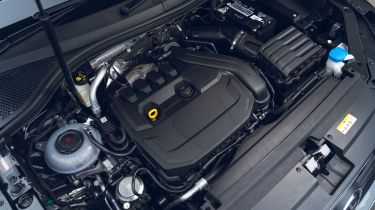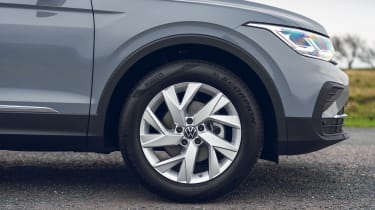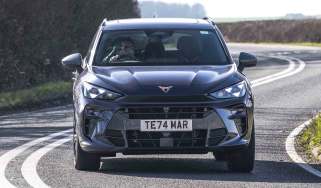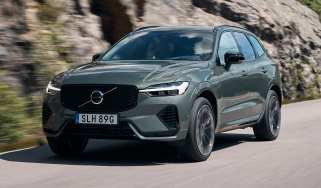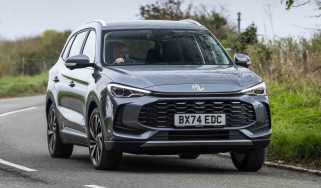Volkswagen Tiguan (2016-2024) - Engines, performance and drive
The Tiguan is a capable cruiser, while R and eHybrid models add extra strings to its bow

Just so you know, this is an older review of the 2016-2024 Volkswagen Tiguan. If you are interested in information about the engines in the latest Volkswagen Tiguan, or news of upcoming Volkswagen models, please follow the links provided.
The Tiguan is based on the VW Group's MQB platform, and it’s easy to spot the chassis’ traits here. The steering is precise and nicely weighted, which means you can make the most of the impressive grip on offer.
However, the primary job of an SUV of this type is to be comfortable, practical and easy to live with, so cars like the Tiguan aren’t the most engaging or sporty to drive. The seven-speed DSG gearbox has closely stacked ratios which give the VW an advantage when accelerating, and only in its overdrive seventh gear does the Tiguan feel sluggish.
On the motorway it’s a decent cruiser, and VW offers a Travel Assist function that combines steering assistance and adaptive cruise control to allow semi-autonomous capability. It can operate when driving on single lane, motorway-style roads, keeping the car in lane and accelerating and braking as required.
Adaptive dampers are also an option, and these bring a notable improvement in ride quality over the standard set-up: most of the time, the VW soaks up bumps with a soft-edged plushness.
Used - available now

2022 Volkswagen
Tiguan
35,397 milesManualPetrol1.5L
Cash £20,499
2020 Volkswagen
Tiguan
45,700 milesAutomaticDiesel2.0L
Cash £17,100
2023 Volkswagen
Tiguan
33,349 milesAutomaticPetrol1.5L
Cash £21,400
2020 Volkswagen
Tiguan
32,800 milesAutomaticDiesel2.0L
Cash £18,500The Skoda Kodiaq has a similar chassis, although its extra body mass and wheelbase length mean more acute impacts aren’t quite as noticeable as they are in the Tiguan, while the damping in a Mazda CX-5 is plusher and better controlled at higher speeds over rough roads.
VW’s 4MOTION all-wheel-drive system features an Off-Road setting that tunes the traction control for maximum grip, but the lack of ground clearance and the use of summer tyres mean you won’t want to venture too far off the beaten track. The VW also leads when it comes to refinement, with good suppression of both wind and engine noise.
As you would expect, the hot Tiguan R ups the ante on the handling front, offering plenty of high-speed grip with little body roll. However, driving enthusiasts may be disappointed by the lack of engagement from a relatively numb chassis, while the ride quality is compromised too by the big wheels and sports suspension, in spite of the adaptive dampers.
The Tiguan eHybrid feels much like the rest of the family on the road, except during cornering when the extra weight of the battery and motor makes itself known.
0-62mph acceleration and top speed
Here, the diesels make the most sense; they're refined and offer the best mix of economy and performance. The 148bhp TDI is able to reach 0-62mph in 9.4 seconds, with a top speed of 124mph. Moving up to the top-spec 197bhp TDI variant means an improved sprint time of 7.4 seconds, and a 134mph maximum.
The entry-level 1.5-litre petrol TSI Tiguan manages the same dash in a more sedate 10.9 seconds, while the more powerful 148bhp car improves on this with a 9.4 second time - dropping to 9.2 with the DSG automatic.
The plug-in hybrid posts a 0-62mph figure of around 7.5 seconds and a top speed of 127mph. The Tiguan R (with 316bhp and 420Nm of torque) knocks off the benchmark sprint in just 4.9 seconds, and will charge on to 155mph.
More reviews
Car group tests
In-depth reviews
Used car tests
Which Is Best
Fastest
- Name2.0 TSI 320 4Motion R [Black Style Pack] 5dr DSG
- Gearbox typeSemi-auto
- RRP£52,380

